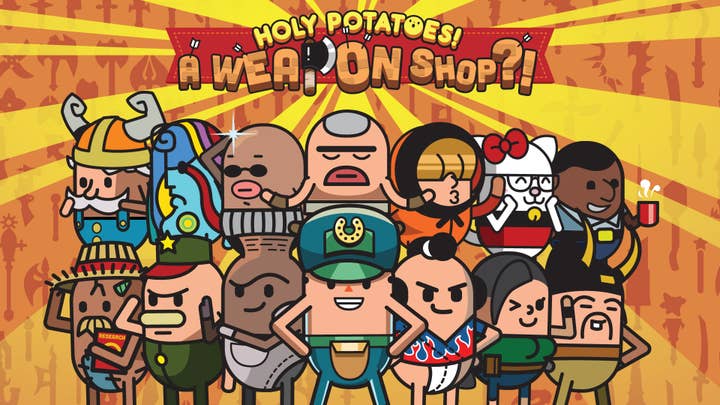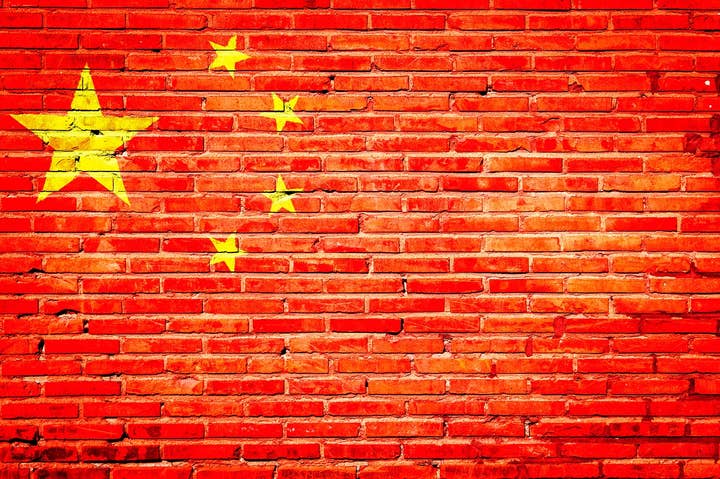How China's political influence is changing game development
And how does this affect the developers in the surrounding countries, particularly for Taiwanese and Hong Kong studios?
There has been an almost biblical flood of press surrounding China's regional prominence -- and the growing influence the country has on global affairs.
Take, for instance, the Xinjiang cotton controversy, which saw global and Western retailers gradually vanishing from the country, as more brands took steps to avoid Xinjiang cotton due to accusations that these were produced by forced labor. But these restrictions are difficult for brands to completely disentangle themselves from; after all, many fear losing access to a potential market of 1.4 billion people.
Likewise, the country's regional dominance can also be felt through its colossal games market: now with a staggering number of 325.4 million PC players, making China's PC market the largest in the world. Even for an industry that prides itself as staunchly apolitical -- that is, with most big developers steering away from expressing any overt political messages in their games until very recently -- the global games industry has seen its fair share of contentious incidents, following China's increasingly assertive bid to exert its sovereignty over countries like Taiwan and Hong Kong.
"We can't say anything that disobeys or dishonors them. We have to recognize Taiwan as a province of China or at least be quiet"
'Vincent', Taiwanese developer
These are no longer just ripples spreading across the industry, but colliding waves that leave fissures behind. 2019's infamous Blizzard scandal, with the publisher banning Hong Kong esports player Blitzchung after he voiced support for the Hong Kong protest during BlizzCon 2019, was met with nearly unanimous disapproval in the industry.
"We can't say anything that disobeys or dishonors them," said Vincent, a Taiwanese developer, who requested anonymity to avoid any repercussions from speaking on these thorny issues. In fact, most of the Hong Kong and Taiwanese developers I've spoken to -- save for one developer -- are reluctant to speak on the record.
"We have to recognize Taiwan as a province of China or at least be quiet. What happened to the gaming market is not unique. You can see it from companies that have been targeted for refusing the use of Xinjiang cotton."
Then there are lesser known incidents like the subsequent removal of Cytus II -- a music game by Taiwanese studio Rayark Games -- in China, upon mainland Chinese players' discovery of a pro-Hong Kong message hidden in morse code inside a song by its music director Wilson Lam. The composition was only uploaded to his private soundcloud, and isn't featured in Cytus II. A few days later, Lam responded by publicly resigning from his position at the studio, in an attempt to divert criticism from his colleagues at Rayark.
Rather than an internal, top-down directive enforced by the Chinese government, this incident was uncovered by mainland Chinese players themselves -- a trend that April (pseudonym), a Taiwanese developer, found troubling.
"I think this is a systematic problem that they are censoring... the creator related to a game -- but not only [limited to] the content in the game. And even if the content is removed or causing people to resign from their job, it is not initiated by the Chinese government, but the shadow of self-censorship [that] had caused this," she adds.
Discussions around Taiwan's political status is already a thorny subject; one instance, as April recalled, involved an enthusiastic player at a Shanghai games event, who asked if her studio's game was a local one. Recognizing the precariousness of their situation, her colleagues simply replied that they were from Taipei, only to have another player, who overheard the conversation, point out that their game is a local product; its implication being that Taiwan is inseparable from China.
Of course, player-induced backlash isn't unique to the Chinese games community; it's equally prevalent in Western communities, too. But what makes this distinct is the reception that Western and regional publishers carry towards Taiwanese games -- a sentiment that's tinged with both cautiousness and curiosity. This is particularly so ever since the uproar over Red Candle Games' horror release Devotion, which contained an unflattering reference to the Chinese president Xi Jinping, discovered by mainland Chinese players themselves.
"It's hard to [become] that hero to make something against the rules. Up to this point, I don't think there are any heroes, and I don't think there will be any"
'Adam', Hong Kong indie developer
"We've talked to probably three to five Chinese publishers, [who] just openly talk about the concerns about games from Taiwan. So, that's a big deal for probably a lot of us," shared David (pseudonym), a Taiwanese developer.
In short, it's an accessibility issue exacerbated by language barriers, at least among Taiwanese studios, as David explained: "Because not everyone can speak English with the Western publishers, a lot of indie studios [have to] find local publishers or Chinese-speaking publishers. Some of them [can only] talk to five [publishers], and they never got any response from them."
What this means for some Taiwanese and Hong Kong developers is the need to adjust and amend their games' content for the Chinese market, especially as China's publishers are more stringent about content issues in Taiwanese games. This is all to satisfy an arcane license approval process that even the biggest studios in China, such as Tencent, had once struggled to crack -- and is one that's rife with ambiguous rules and ever-changing regulations.
At the same time, this is exacerbated by the introduction of Steam China in recent months, which has only introduced more trepidation around licensing. Steam has been operating in China in an unofficial capacity for a while, but many indie developers who rely on this gray version of Steam to sell their games in the country feared that the introduction of the official version will close their access to the Chinese market.
Vincent pointed out the popularity of games centered around Chinese historical and palace dramas in the country -- a genre that has been steadily phased out as a result of these regulations.
"Now we barely see it because these imperial-harem competing stories [are perceived to] have a negative impact on the audience. This restriction affects not only topic selection but also the storytelling," he said. "Take crime topics, for example. If you are a Chinese content creator or your main market is in China, it's more than easy to guess the ending -- police and government are always good and will always win in the end. If not, hmmm, this story must happen in a fictional world."

One Hong Kong indie developer who spoke to me was Adam (pseudonym), who also works with game studios on a freelance capacity. He talked about a project he worked on that narrated the history of Taiwan, where his team was explicitly told not to use yellow in their assets -- a color that is distinct to the Umbrella Movement, where yellow umbrellas became the potent symbol of the protest.
"The original piece of art actually included some yellow scarves on hand, which was ordered to be changed because, you know, there's the incident in Hong Kong back in 2014," he added. "Contents have been changed in order to avoid talking about that sensitive incident, [such as] yellow scarves that they put on [their] arms or handkerchief."
"[Our game's] story [contain themes of] government brainwashing... and we are already prepared that if the government reviewer says it is not suitable, we will cut off the story and make it a plain rhythm game"
'April', Taiwanese developer
Making adjustments like these is a resource-intensive endeavour for many indie developers, most of whom are already struggling to make ends meet. "It would definitely cost us time, and some money, and the developing energy, because editing the game to remove one or another part of the game [can change] the game flow," explained April.
Even then, April mentioned her studio still cannot afford to overlook the mainland Chinese market -- which is currently her studio's second biggest source of revenue. This decision all boils down to the straightforward decision of simply having to put food on the table, even if doing so ultimately gets in the way of publishing and artistic freedom.
"We will not give up the Chinese market, because we are still a very small studio and trying to survive so [there] is still a chance that we can probably survive for longer if we can get into the market," April elaborates. "If we are considering making a game [for the Chinese] market, either we self-censor the story or remove the story, or we will try to edit it for a new China special version... For the game that we are trying to obtain license for, we have a story in it, but actually the story there [contain themes of] government brainwashing... and we are already prepared that if the government reviewer that they said the story is not suitable, we will cut off the story and make it a plain rhythm game."
These evolving regulations, too, have reverberations on indie game developers from the South-east Asia region, albeit to a different degree. MT Akbar, an Indonesian developer from Pendopo Studio, shares his concerns about how these could affect their development and revenue. The studio's upcoming title is a cyberpunk dystopian game called Rendezvous -- a game with themes that may not be compliant with the rules for obtaining a license.
"At this point we still don't know some of the contents that are restricted, aside from general issues in politics. We're somewhat cautious on development, on not too openly 'expressing' some major topics, but the content itself still in the game," says Akbar.
On the other hand, another pressing issue for these studios is still the language barrier -- but it's gaining entry into the elusive market that remains their biggest challenge. Alwyn Lee, the co-founder of Singaporean studio Daylight Studios, brought up the linguistic differences between the Chinese language that's spoken in Singapore and China.
"So the problem right now is more of the language barrier rather than the connection, because I feel that a lot of the youngsters nowadays cannot speak Chinese. Even for me, it took me a while to actually get used to the way they speak, because even [though] I speak Chinese at home everyday, going there it's a different ball game and speaking [in] all the game technical terms is also different," he explained.

Talking about his studio's flagship mobile title, Holy Potatoes, he pointed out the different terms used to refer to something as simple as potatoes, much less more technical terms common in game development. "These are all things that we have to pick up along the way."
That said, some indie developers from Hong Kong are not as concerned about these regulations -- not out of foolhardiness, but merely from a sense of pragmatism, as well as an inclination to look outwards to the global games market instead. Johnson Siau, a Hong Kong-based developer who used to work in a local mobile games studio, said there are broadly two categories of developers in the region: one that treats game-making as another form of business venture, and a newer generation of game makers who see games development as a creative outlet. The former, for instance, isn't too fussed about these sea changes; to them, it was simply another obstacle they have to step around.
"Even before the whole political issues, we didn't have a lot of talent staying in Hong Kong. The grass was always greener almost everywhere [else]"
Jonathan Siau, Hong Kong developer
"So like, to me it is... for the older generation, I don't think it affected them much in the sense that they were already on the decline, and they've been struggling to adapt," said Siau. "So this is another hurdle for them... I think they see it as... another obstacle in their path. I don't think they see any recent trends as a unique issue. They're like, they figure something out, or else something's gonna go wrong."
To him, these regulations would probably affect the latter, younger group in a more significant way; that said, he mentioned that many of them are already used to adapting to the rapid changes that govern the regional and global games industry.
"I think they're not as worried. It's just because, based on my knowledge, they were trying to spread out who they approached. So it's not just mainland China... they're like regions, Southeast Asia, or whether it's Western Asia or like, parts of the US. They were already trying to diversify their audience. So to them, it's like, yeah, it's a bit of a pain, but also, it's not their biggest source of income," he explained. "I don't think it affects them too much, just because they're used to having to adapt so quickly and having to change so quickly."
This mirrored what Mary (pseudonym), another Hong Kong-based developer, told me about the state of indie game development in Hong Kong: "Because we are purely indie, I am more concerned about the business model that's very mainstream not only in China, but almost everywhere -- game development and publishing rely heavily on capital investment and buying traffic. The indie scene is entirely different than 10 to 15 years ago. Everyone has to play the Steam game, [and] for us as an arty label, we are more concerned of competing against big studios in US, China and elsewhere as they have much more power in every stage of development and marketing."
Rather than the complexity of China's game-making regulations, she believed that there are bigger challenges on the horizon for the local game development scene, such as how Hong Kong never really had the infrastructure to adequately support game development in the first place.
"In general, I believe in Hong Kong, the difficulty of making games has much to do with industrial infrastructure at this stage. Unlike Taiwan and China, Hong Kong never even had a mid-size studio, let alone a big one like SoftStar [a AAA games studio based in Taiwan] or Tencent."

Other Hong Kong indie developers like Adam are embarking on a more drastic route: to avoid working with any teams with ties to mainland China altogether. The anti-extradition movement that began in 2019 in Hong Kong was his turning point, as he referenced the first death that took place during the protest: Marco Leung Ling-Kit, a 35-year-old protester who fell 17 meters from a scaffolding, and whose death became a pivotal moment for many Hong Kong protesters. That said, Adam was still aware of the influence the mainland Chinese market wields on the region, and understood that this wasn't a foolproof approach.
"I avoided contact with companies that... have a close linkage with China developers or China capital. But if they do, which I may or may not know, I cannot avoid it, " he said. "And another information that I might be able to reveal is that the company that I have been working for has shifted their focus from [the] Taiwan market to China market. And it's very obvious, which it is very safe to say that they have their majority of their income from the China market."
The biggest fallout from this entire debacle, as shared by Siau and the Hong Kong developers, would probably be the brain drain that will see Hong Kong talent moving out of the country in order to pursue their game development dreams. In fact, some of them are already based abroad, due to the dearth of opportunities in local shores.
"I can see them moving out of Hong Kong as a way to continue if their product really is impacted by the way recent trends have been happening," Siau shared. "Especially between mainland China and Hong Kong, I can see them just getting out... just thinking about, you know, even before the whole political issues, and so on and so forth, we didn't have a lot of talent staying in Hong Kong. The grass was always greener, almost everywhere compared to Hong Kong."
At the end of the day, the developers I spoke to seemed cautious -- perhaps even cornered -- by the burgeoning influence of China's politics in the region. When I asked him if these would affect any future plans he had, Adam only laughed, a note of resignation audible in his voice. He could not foresee anything changing for at least a decade or so, suggesting that unless a bigger market emerges that's a lot more receptive to creative freedom, studios in this region can only "play along with the rules."
"Personally I'm very sad with how the market leans towards China, but that's the fact that the market is there, and personal views cannot change such trends at all," he said. "It's hard to stand out [and become] that hero to make something [that's] against the rules. Up to this point, I don't think there are any heroes, and I don't think there will be any."
Lead/social media image by Pete Linforth from Pixabay

